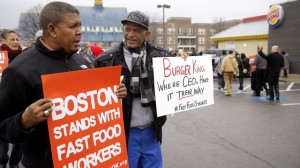
Pedro Rodriguez, right, talks with Andrus Reyes as they participate in a demonstration on a Burger King parking lot as part of a nationwide protest supporting higher wages for workers in the fast-food industry and other minimum wage jobs in Boston, Thursday, Dec. 5, 2013. (AP Photo/Stephan Savoia)
On Friday, the Minnesota House approved raising the state minimum wage to $9.50 per hour. According to the National Employment Law Project (NELP), it’s the fifth state to hike the minimum wage this year, following Delaware, West Virginia, Connecticut and Maryland, which just approved its hike earlier this week.
Two aspects of the Minnesota bill make it especially helpful for low-wage workers. First, there is no carve-out for tipped workers — they will be paid the same minimum wage as everyone else and any tips they make on top of that are (forgive the pun) gravy. As Saru Jayaraman, co-founder of the Restaurant Opportunities Centers United, told Bill Moyers last week, the federal minimum wage for tipped workers is just $2.13 per hour, as it has been since 1991, because tips are considered part of income, even though they are random and often meager.
Second, Minnesota’s minimum will now rise automatically with the cost of living. That means it won’t lose its value over time. If the federal minimum wage — which hasn’t been raised since 2009 — had been indexed to inflation, it would have stood at $10.74 last year rather than $7.25.
According to a statement by NELP, “More states are expected to approve minimum wage increases in the coming weeks.”
Yesterday, the Vermont House approved a bill to increase the state’s minimum wage to $10.10 per hour, with a parallel bill expected to pass the state Senate in the weeks ahead. On Tuesday, the Hawaii House approved a bill to raise the state’s minimum wage to $10 per hour, which now heads to the state Senate for final consideration.
Measures to raise the minimum wage are also expected to appear on the ballot this November in a number of states across the country, including South Dakota, Alaska, Michigan, and Arkansas.
A growing number of localities have also raised their minimum wages significantly above the federal and state level. Cities and counties that have enacted higher minimum wages in recent years include San Francisco ($10.74 per hour), Santa Fe ($10.66 per hour), San Jose ($10.15 per hour), Washington, DC ($11.50 by 2016), Montgomery County, MD ($11.50 by 2017), Prince George’s County, MD ($11.50 by 2017), and SeaTac, WA ($15 for certain occupations).
Last Month, Chicago voters overwhelmingly passed an advisory referendum to raise the minimum wage to $15 per hour for the city’s largest employers, and the Richmond, CA City Council just approved an increase to $12.30 per hour. Other cities that are pursuing higher minimum wages include Seattle ($15 per hour), San Francisco ($15 per hour), New York City, San Diego, Oakland, Portland, ME, and Las Cruces, NM, to name a few.

